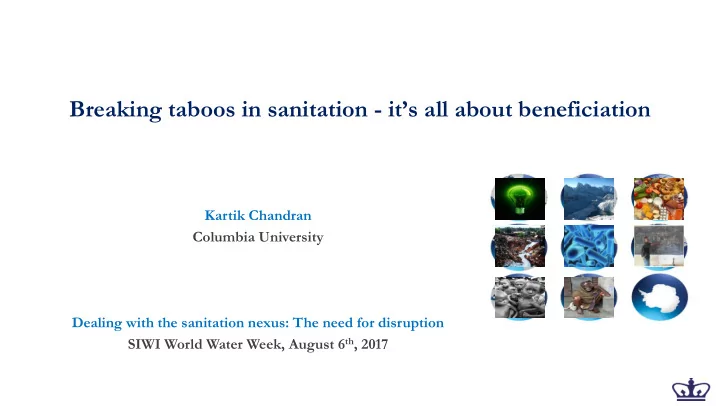

Breaking taboos in sanitation - it’s all about beneficiation Kartik Chandran Columbia University Dealing with the sanitation nexus: The need for disruption SIWI World Water Week, August 6 th , 2017
Brief overview of biological sewage treatment Solids, inerts Aerobic C &N Recycle of bacteria Disinfection and separation removal discharge • A high fraction of WWT energy goes to aeration • $MM in organic chemical purchase • Bacteria could produce unwanted products (N 2 O)
Energy consumed annually Energy consumed annually for (tera tons oe) water (assuming 3%, tera tons oe USA 2.4 0.07 Ghana 0.01 ?
The potential for beneficiation and recovery • Distributed (networked) treatment in NYC • Flow: 1.2 billion gallons per day – 1860 tons of organic carbon per day – 280 tons of N(-III) per day – 60 tons of P(+V) per day
Energy self-sufficiency in sanitation and wastewater treatment? Energy present Energy needed ~ 2500 kWh/MG ~2500 kWh/MG • Assuming 34% conversion of organic matter to methane and electricity • Assuming ‘conventional’ BNR • Can ‘import’ carbon – Not at the expense of excessive nutrient discharges
Shifting to Engineered Resource Recovery from ‘Waste’ Streams K. Chandran, In ‘Water Reclamation and Sustainability’, 415 -430, Elsevier, 2014
Potential for C- recovery is immense, but… Fertilizer Commercial Biofuels chemicals … needs to address a higher objective
Internal use of VFA for enhanced BNR Dual-Phase Digestion and Fermentation of AS • Fermentation of PDS to produce VFA – Used mainly for denitrification – Kinetics higher than MeOH PDS fermentation and storage at 26 th Ward WPCP in New York City, 2002
Lipid Production from ‘waste’organics Anaerobic Organic Convert VFA to Harvest fermentation to waste lipids produce volatile and extract fatty acids (VFA) Convert lipids lipids to …
Sewage sludge to methanol Nitrite Oxidation of ammonia as the primary energy source for energy metabolism Biomass Water Ammonia AMMONIA OXIDIZING BACTERIA Methanol O 2 CO 2 Oxidation of methane via co- metabolism, without net energy synthesis Methane • Upcycling CH 4 to chemicals for ‘internal’ use Taher and Chandran, ES&T, 2013
De-centralized infrastructure in future cities water +x • Scaling down recovery of water, energy and nutrients
Carbocycle Biological conversion
Advance H2O NSF I-Corps, NYSERDA Powerbridge
Acknowledgements Bill & Melinda Gates Foundation, National Science Foundation, NYSERDA, WE&RF Paul Busch Award Shashwat Vajpeyi, Justin Shih, Ato Fanyin Martin, Edris Taher, Yu-Chen Su, Young Lee
Linking resource recovery to other challenges Food security Food security Food security Technology and engineering Technology and engineering Technology and engineering Recover C-energy Recover C-energy Recover C-energy Recover P Recover P Recover P Recover N Recover N Recover N Disinfection Disinfection Disinfection
Potential for C- recovery is immense, but… … needs to address a higher objective
Recommend
More recommend